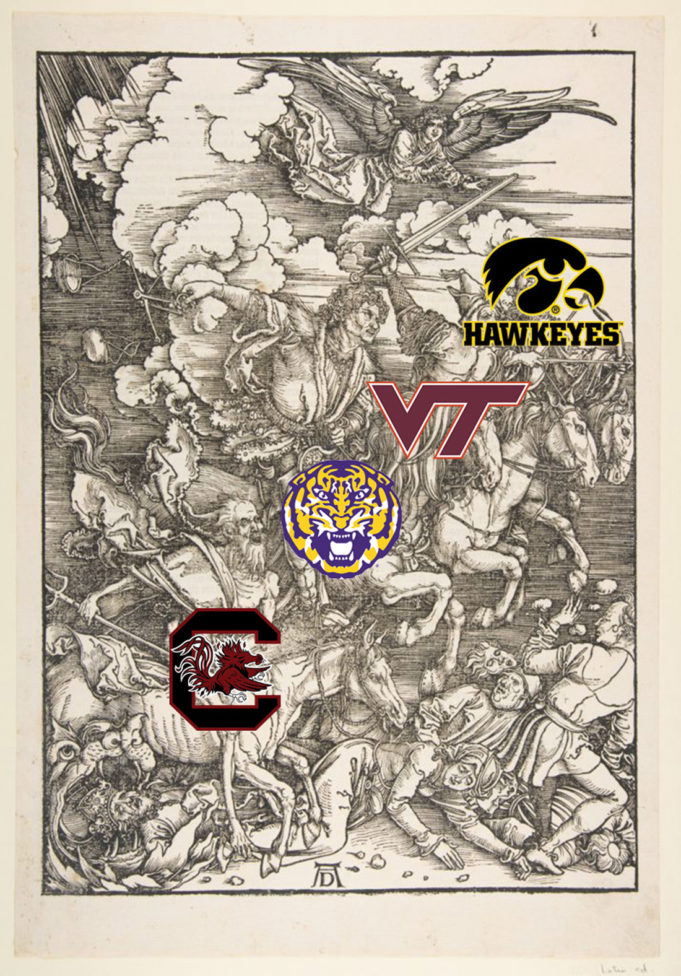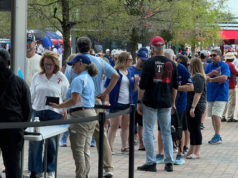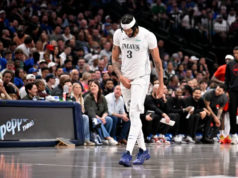I don’t care much for the WNBA. Don’t jump to conclusions. It’s not gender-fueled rhetoric, because I don’t much care for the NBA, either. Maybe my elder-Millennial cognition has slowly eroded as more technology invades my life. It’s also likely I have a touch of attention deficit disorder, but professional leagues in which more than 50 regular-season games are played (hockey, basketball, baseball especially) just don’t carry the weight game-to-game for me to follow and give a damn before playoffs commence.
The men’s NCAA tournament this year featured one good week: the first. Semi-historic upsets of a 16 eliminating a top seed were replicated, and highly touted benches were sent packing early and often. But there’s a fine line between teasing potential underdog victors and literally eliminating every squad the layperson thought might appear in the final four. Well, David slayed Goliath — repeatedly — and the sport and ratings suffered for it. The round-of-64 brought record viewership this year, but as network executives were lighting bonfires with Cuban cigars and showering with Glinlivet, they performed an about-face as later rounds experienced a sharp ratings drop. Top — and even mid-tier — household names were dismissed as the DJ queued the “Electric Slide” and everyone downed their drinks and left.
The highest seeded Final Four team was the University of Connecticut — who advanced to win the national championship — and they’re the only power team despite not appearing in the semifinal since 2014. The Huskies were a regular contender in the early 2000s and had won four championships since ’99, but as a fourth seed out of the mostly defunct Big East conference, they were hardly expected to play for it all this year and were the highest ranked team remaining after the quarterfinals. Florida Atlantic University were the annual Cinderellas after dispatching Kansas State during the Elite Eight and are tied for the sixth-lowest seed to ever appear in the fourth round. (No squad lower than 11th has ever made the semifinal.) The Owls looked to be in position to punch their ticket as the largest underdog to play for the title before the San Diego State Aztecs went coast-to-coast with less than 10 seconds remaining before hitting a fadeaway jumper for a walk-off one-point victory as the backboard rectangle glared red.
The Aztecs are underdogs of sorts, never advancing past the Sweet 16, in which they’ve appeared twice. Longtime Frog fans are no stranger to the black-and-red basketball prowess, and the Mountain West ballers spent years beating on the beleaguered Horned hoopers when the two shared conference affiliation for six years. The Aztecs’ last-second downing of the Owls was the game of the weekend — on the men’s side — while UConn ran roughshod over Miami, winning by 13 points, the same margin the Huskies held at halftime.
As much as ESPN tried to spin a historic championship contest while the Aztecs appeared for the first time, a sleepily comfortable margin was taken by the Huskies early on and never relinquished. UConn carried a 12-point lead into halftime and widened that margin to 17 by the final buzzer to cement their fifth title in a quarter century, marking them as an almost-blue-blood program along with North Carolina, Duke, and Kentucky.
This year’s NCAA tournament, outside of the opening round, was and has been about the women’s side. The ladies carried better stories, more outstanding individual performances, and more contentious on-court behavior than their counterparts. Numbers don’t lie. Audiences loved the ladies this season, and the women’s Final Four viewership was up 43% from last year. I refuse to lie by omission. Their raw numbers weren’t as high as the men’s tourney, but it’s a stark uptick if nothing else. You’d have to be buried in a deep sports-avoidance hole not to have heard the name Caitlin Clark this week thanks to her unapologetic nature and incredible individual performances. Clark scored 191 points in the tournament, which is the most by a player — man or woman — ever. She recorded 60 assists, which is a new women’s record, only one shy of tying the most in either gender’s tournament. She was arrogant. I wouldn’t call it over the top but very un-Iowan about reminding opponents of her prowess after drilling a three-pointer from what seemed like half court. Clark and the Hawkeyes, who were still a dominant two-seed, did the unthinkable by downing the unbeaten South Carolina Gamecocks during the Final Four — Clark had 41 points in that game, more than the rest of her team combined.
On the other side of the bracket were the third-seeded and only twice-beaten LSU Tigers. It’s hard to fathom how such a deep and dynamic squad led by a hall of fame coach was a three seed after losing only to South Carolina and Tennessee. Their leader, Kim Mulkey, is basketball royalty and continues to prove she’s just going to win everywhere doing anything she decides to. Despite Clark’s tournament domination, the Tigers proved themselves the superior top-to-bottom team and wrangled Mulkey her seventh NCAA championship ring (two playing, one as an assistant coach, and four — three with Baylor — as a head coach). The legend should really consider appearing in a hip-hop video wearing all of her bling in addition to her Olympic and Pan-American gold medals, then just throw in her honor cords for being her high school’s valedictorian to boot, and she’ll ice everyone else out of the shot. The native of Louisiana is now also the only women’s head coach to win a title at multiple schools and only one of two coaches (Rick Pitino) to do so in college basketball at large.
Despite the LSU-versus-Iowa national championship game failing to be nail-biting on the scoreboard, the personality clashes between Clark and LSU’s headliner Angel Reese provided the drama that the game and their sport needed to remain captivating at the conclusion of a tournament that had already categorically outshined their male counterparts. Reese waving her hand in front of her own face — in Clark-like fashion — before pointing to her empty ring finger which would soon be weighed down was a beautiful and brazen gesture needed to bring Cajun spice to a sport which is too often perceived as blander than Heartland soul food.












